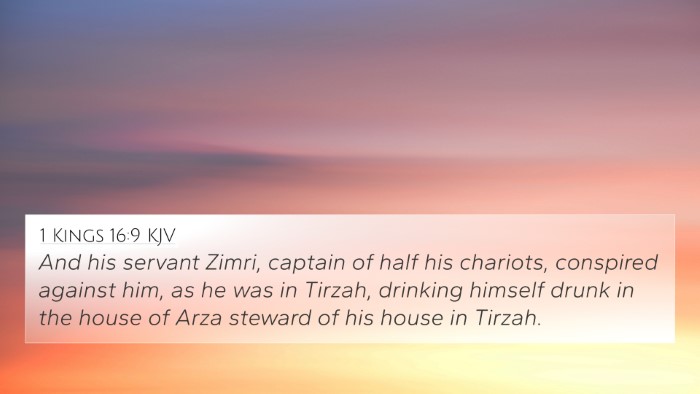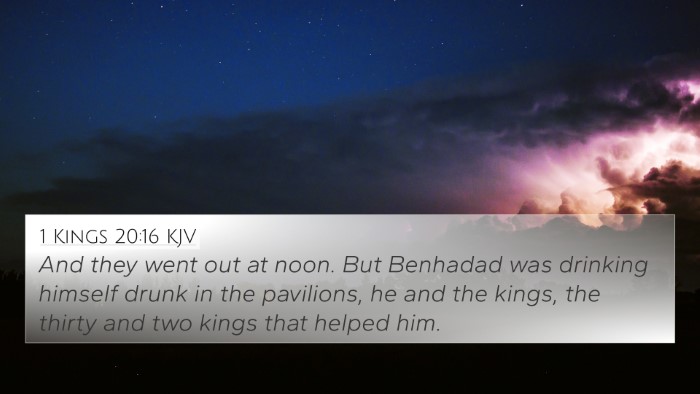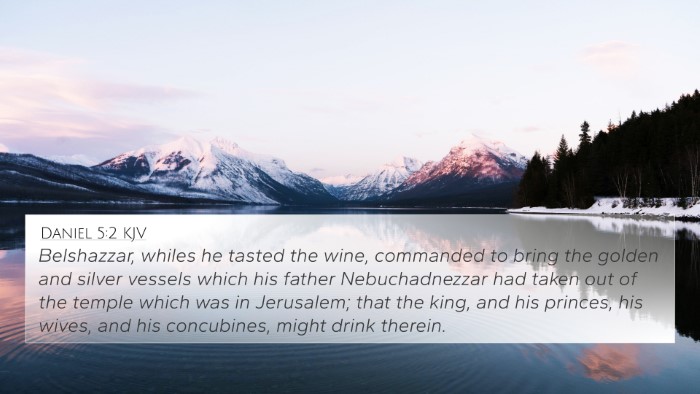1 Kings 20:12 - Bible Verse Meaning and Interpretation
The verse 1 Kings 20:12 states: "And it came to pass, when Ben-hadad heard this message, as he was drinking, he and the kings in the pavilions, that he said unto his servants, Prepare they the asses." This verse provides a significant moment in the context of the conflict between Israel and Syria, specifically focusing on the actions of King Ben-hadad in response to intelligence he has received.
Summary of Meaning
In this passage, King Ben-hadad displays a careless attitude, engaging in revelry while contemplating a serious matter of war. His command to prepare the asses (or horses) signifies his intent to act boldly, despite the warnings he has received. This juxtaposition highlights the contrast between his seemingly trivial pursuits and the gravity of impending conflict.
Combined Insights from Public Domain Commentaries
-
Matthew Henry:
Henry emphasizes that Ben-hadad's drinking is emblematic of his pride and overconfidence. He suggests that this behavior is indicative of a ruler who is oblivious to the strategy and power of Almighty God, thus leading to his downfall. Henry points out that the contentment in drinking while plotting war suggests a lack of seriousness and preparation in spiritual matters.
-
Albert Barnes:
Barnes acknowledges the context of Ben-hadad being surrounded by other kings and engaged in distraction, illustrating a tendency among rulers to disregard the seriousness of their situation when indulging in pleasures. He draws attention to the folly of underestimating one’s enemies, highlighting the importance of vigilance and preparation, which Ben-hadad neglects in his inebriated state.
-
Adam Clarke:
Clarke notes that Ben-hadad’s behavior is a warning against complacency. He interprets this moment as a pivotal point, where the king's intoxication represents not just a physical state but a spiritual blindness to the realities of God’s judgement. Clarke often suggests that this account serves to illustrate how pride leads to destruction, especially in leaders.
Cross-References for Deeper Understanding
This verse connects and resonates with various scriptures throughout the Bible. These cross-references provide additional insights into the themes of pride, folly, and divine authority. Here are several notable connections:
- Proverbs 16:18: "Pride goes before destruction, and a haughty spirit before a fall." - This verse parallels the pride shown by Ben-hadad.
- Isaiah 14:13-15: Reflects on the downfall of a proud ruler, emphasizing the dangers of overconfidence.
- 1 Samuel 2:3: Highlights God's awareness of arrogant thoughts and the consequences that follow.
- Ecclesiastes 7:2: Illustrates the wisdom of reflection in the face of death versus the folly in revelry.
- Lamentations 2:15-16: Conveys the ridicule of those who thought themselves invincible, drawing parallels with Ben-hadad.
- Matthew 7:26-27: Talks about the foolish man who builds his house on sand, likening it to the folly of ignoring sound advice before impending disaster.
- James 4:6: God opposes the proud but gives grace to the humble, a reminder of divine justice against prideful actions.
- Psalm 37:12-13: Speaks of the wicked plotting against the righteous, mirroring Ben-hadad’s intentions and their ultimate futility.
- Jeremiah 50:31: "Behold, I am against thee, O thou most proud, saith the Lord God of hosts." This illustrates God’s stance against prideful nations and leaders.
- 1 Peter 5:5: Exhorts the younger to be submissive to the elder, echoing the importance of humility in leadership.
Thematic Connections and Inter-Biblical Dialogue
The narrative encapsulated in 1 Kings 20:12 is rich with themes that resonate across Scripture. The dynamics of power, pride, and humility surface prominently within both the Old and New Testaments, illustrating a consistent caution against overconfidence in human capabilities and the folly of neglecting divine wisdom.
Exploring the connections between Bible verses, such as linking the arrogance of Ben-hadad with the eventual downfall of Nebuchadnezzar in Daniel 4:30, offers a comprehensive biblical narrative that warns against self-reliance and pride. The act of cross-referencing biblical texts reveals not only the consistency in God’s judgments but also His grace to those who heed His warnings.
Conclusion
1 Kings 20:12 serves as a powerful reminder of the consequences of pride and the importance of humility in leadership. Through comparative Bible verse analysis and thematic links to other scriptures, one can appreciate the depth of meaning found in this single verse. The insights drawn from public domain commentaries reinforce the necessity of spiritual preparation and the perils of complacency in the face of divine authority.
For anyone studying the biblical texts, tools for cross-referencing, such as Bible concordances and reference guides, facilitate a deeper understanding of connections between Bible verses, enriching one’s study experience and spiritual growth.












